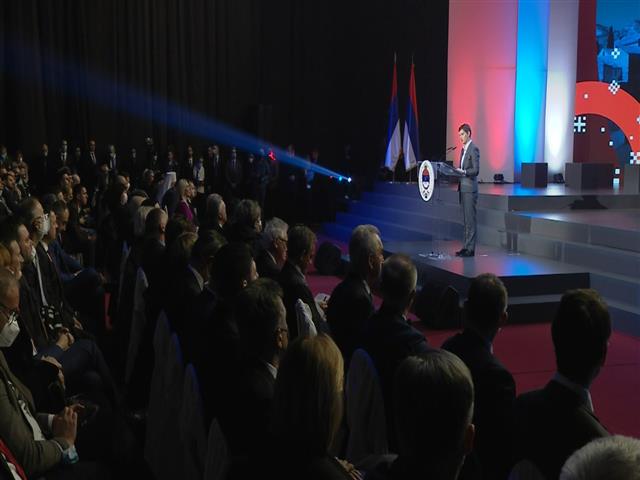8.1.2022.
Prime Minister Ana Brnabic stated today that Republika Srpska was created on genocide, but on genocide against the Serbian people, which was planned and carried out in detail in the 1940s, with a clear intention to continue and end it 50 years later.

If there was no suffering of the Serbian people from 1941 to 1945 and if there was no salute "Za dom spremni" again in 1991, there would be no Republika Srpska, Brnabic pointed out, speaking at the Ceremonial Academy on the occasion of Republika Srpska Day in the Borik Sports Hall in Banja Luka.
I believe that they would complete the "job" that they started 50 years earlier and complete the "job" of extermination of the Serbian people and the Orthodox faith, the Prime Minister stressed, adding that Republika Srpska is, above all, an indicator of how much the Serbian people were determined to prevent a recurrence of World War II atrocities.
Republika Srpska is the fruit of the desire for peace, for freedom, for the safe upbringing of children, the desire that crimes against the Serbian people do not continue and do not repeat. Both we Serbs and we in Serbia must be the first to know that, and we must be the first to defend Srpska, said Brnabic.
She pointed out that she is extremely honoured to be in Banja Luka today, to take part in marking an important date such as Republika Srpska Day, and to have the opportunity to convey congratulations and greetings to Serbian President Aleksandar Vucic and Serbian citizens.
The Prime Minister said that, as the Prime Minister of the country that is the guarantor of the Dayton Agreement, she is extremely concerned about the challenges and problems Republika Srpska is facing, its leadership and the representatives of the Serbian people in Bosnia and Herzegovina.
I am deeply concerned about the decision of the United States, as well as the manner and explanation of the imposition of sanctions on Milorad Dodik. That requires us to behave rationally, responsibly and seriously, without making hasty decisions, she pointed out.
The fact is that sanctions have never been the solution to any problems. That is why, I want to say again what President Vucic said: Serbia will never impose sanctions against members of its people and representatives of the Serbian people in Bosnia and Herzegovina and Republika Srpska, Brnabic emphasised.
She stated that the policy of Serbia “Open Balkans” is cooperation, and not conflicts.
It is a policy that wants to create conditions in the Balkans for a different future from the past I talked about. The policy of economic and infrastructural connections, deepened cooperation, prosperity and economic revival of all peoples in the Balkans. Not borders and restrictions, but the free flow of people, goods, capital and services, the Prime Minister explained and reiterated that Serbia is facing the future.
She pointed out that Serbia will continue to work on strengthening ties with Republika Srpska, on improving the economic position and development of the cultural life of the Serbian people, and that no one can forbid it.
Since 2014, we have invested more than €88 million in aid to Republika Srpska. I am proud of our participation in humanitarian actions, construction of schools, kindergartens, ambulances, roads, communal infrastructure, cultural centers - all projects whose goal is a better quality of life for all citizens, the Prime Minister underlined.
The Serbian people remain committed to preserving freedom, equality and justice, and these are the true virtues that we preserve and pass on to future generations. Long live Republika Srpska, said Brnabic.